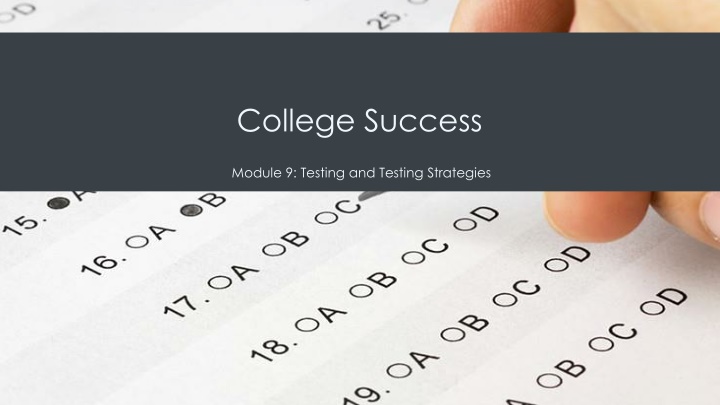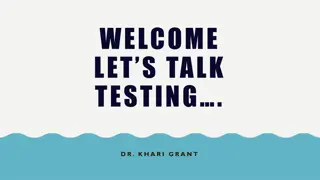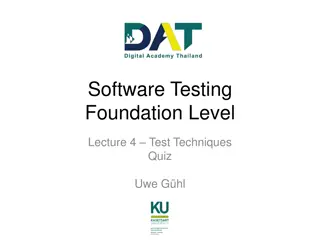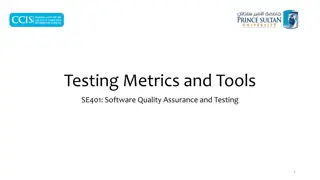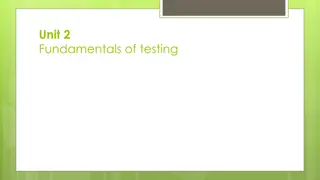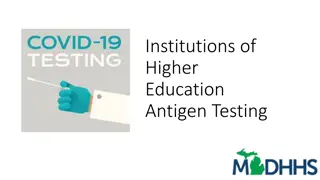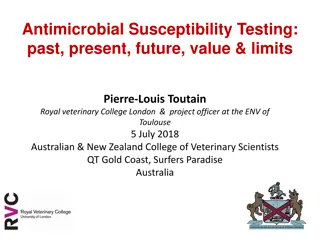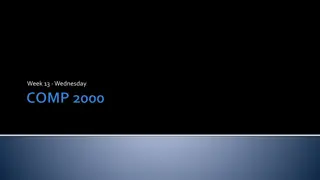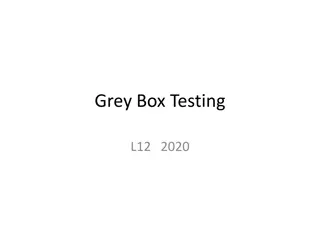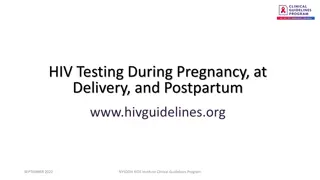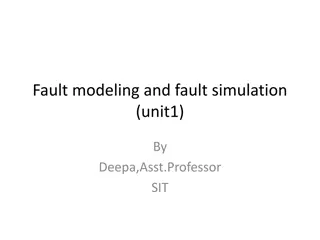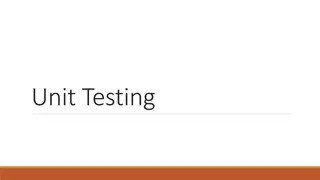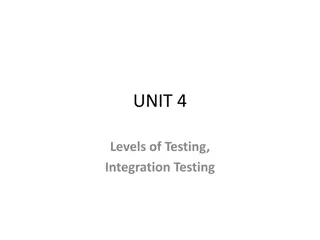Effective Testing Strategies and Techniques
Explore strategies for successful test-taking, managing test anxiety, and enhancing learning from mistakes. Learn about common types of college tests, preparation strategies, and test-taking tips. Join group discussions on pre-test strategies and improve test-day readiness with practical advice.
Download Presentation

Please find below an Image/Link to download the presentation.
The content on the website is provided AS IS for your information and personal use only. It may not be sold, licensed, or shared on other websites without obtaining consent from the author.If you encounter any issues during the download, it is possible that the publisher has removed the file from their server.
You are allowed to download the files provided on this website for personal or commercial use, subject to the condition that they are used lawfully. All files are the property of their respective owners.
The content on the website is provided AS IS for your information and personal use only. It may not be sold, licensed, or shared on other websites without obtaining consent from the author.
E N D
Presentation Transcript
College Success Module 9: Testing and Testing Strategies
Module Learning Outcomes Describe factors in successful test taking including testing strategies, dealing with test anxiety, and learning form your mistakes 9.1: Explore techniques for doing well on tests 9.2: Explain how personal factors can affect test taking including test anxiety 9.3: Explore how testing benefits learning
Learning Outcomes: Testing Strategies 9.1: Explore techniques for doing well on tests 9.1.1: Identify common types of tests given in a college class and their purposes 9.1.2: Identify effective strategies for preparing for a test 9.1.3: Identify test-taking strategies to improve your performance
Common Types of Tests Test Type Formative Pre-assessment To assess pre-existing beliefs, assumptions, knowledge, and skills about a topic. Inform teaching needs and create baseline for learning Summative To assess whether learning has been achieved by demonstrating a benchmark standard To monitor learning progress and inform teaching needs Test Format Oral Discussion Based Subjective Verbally answer questions to demonstrate knowledge Written Physical Skills Performance Based Objective & Subjective Demonstrate physical ability to perform a task Written Objective & Subjective Common question types: Multiple Choice, True/False, Matching, Fill-in-the-blank, Essay
Class Discussion: Pre-Test Strategies Active Learning Note Taking Get into groups of four Share and record pre-test taking strategies of each person in your group Place each strategy into one of the 5 categories on this slide Identify which area your group focuses on the most Brainstorm additional strategies for the 1-2 least used categories Ask Your Instructor Study Habits Test Day Preparation
Test-Taking Strategies BEFORE TURNING IN L UPON RECEIVING YOUR TEST L A ESSAY QUESTIONS O START B B2 W LOOK ASK BUDGET BEGIN x2 OUTLINE WATCH LOOK Read all directions Ask questions if you have them Budget your time based on point allocation Answer easiest question(s) first Plan your essay by making a rough outline on scratch paper first Watch for key words like: Review every question Underline test words analyze define evaluate illustrate Guess on unanswered questions Begin essays with a thesis Circle questions you are unsure of
Practice Question 1 A quiz given on the first day of class that is intended to gauge your previous knowledge, beliefs, and attitudes is considered which type of test? A. Formative B. Summative C. Pre-assessment D. Pop-quiz
Practice Question 2 Which is test-taking strategy helps to ensure that you answer every required question? A. Begin with the easiest questions B. Budgeting your time C. Reading each set of directions D. Looking over your completed test thoroughly before turning it in
Learning Outcomes: Test Taking Challenges 9.2: Explain how personal factors can affect test taking including test anxiety 9.2.1: Identify sources of test anxiety and techniques for preventing and controlling it 9.2.2: Describe whole person approach to testing
Test Anxiety Test Anxiety Defined: Anxiety or fear related to a real or anticipated testing situation HARMS: Poor Test Performance BENEFITS: Enhances focus and provides energy Symptoms PHYSICAL Shortness of breath Pounding heartbeat Dizziness Vision changes Sweating Shaking Nausea Temperature change MENTAL Distraction Memory Loss Negative Attitude Confusion Doubt
Sources of Test Anxiety Uncertainty about the exam Self-fulfilling prophecies Envisioning worst case scenarios Imagining extreme consequences to the test result
Reducing Test Anxiety Pay attention to Mental Health Meditation sessions Address Uncertainty Maintain Physical Health Make A Plan Ask about the exam Create a 5-day study plan Keep exercising Get regular sleep Take inventory of your notes Set a study schedule Avoid burnout by keeping study sessions short Eat a balanced diet Don't try to be perfect Reach out for help
Class Activity: Test Anxiety Write for five minutes about a time that you felt test anxiety. What was the class? What were your physical symptoms? What were your mental symptoms? How did you handle it? Ask for volunteers to share their experiences.
Whole Person Approach School is just one aspect in the broader context of your life We attempt to balance achieving our best in school with the time and energy necessary to be present for other events in our lives. Whole Person Approach Involves: Organization, Scheduling, Attention to detail Establishing Realistic Expectations for test situations Understanding Accommodations and Responsibilities
Class Activity: Its All About Balance Create a list of the various responsibilities and roles you have outside of school Create a list of circumstances that you need to navigate in order to be present in one or more aspect of your life Create a list of unexpected events that have impacted your ability to be present in one or more aspect of your life In groups of 4, discuss how each person organizes and schedules their life to achieve balance amongst their responsibilities, circumstances, and the occasional unexpected event
Practice Question 3 Gerald is doing his best to maintain a regular schedule during his day. His thoughts often drift to his upcoming history test and he begins sweating, wondering if he s studying enough or what type of format the questions will be asked. What is the likely source of Gerald s test anxiety? A. Uncertainty about the exam B. Envisioning worst case scenarios C. Self-fulfilling prophecies D. Imagining extreme consequences to the test result
Practice Question 4 Elisa is stressing out about her Geography exam. She has a very busy week at work, her kids are on spring break, and she feels a cold coming on. What Whole Person approach can Elisa use to reduce her test anxiety? A. Organize, schedule, and pay attention to details B. Ask about the exam (materials covered, format, points, level of detail, etc) C. Understand accommodations and responsibilities D. Establish realistic expectations for her geography exam
Learning Outcomes: Evaluating Results 9.3: Explore how testing benefits learning 9.3.1: Identify the learning benefits of test taking 9.3.2: Identify strategies for learning from mistakes and from doing poorly on tests or exams
Benefits of Test Taking Identify strengths and weaknesses Encourages study and less procrastination Improves long-term retention due to retrieval of information during the test Helps to organizes knowledge and retrieve information more efficiently
Review your results Diagnose your Performance Being Poor Testing Strategy Left the exam room a little early Silly Mistakes Timing Issues Self-Doubt Unprepared Not understanding Misreading directions Messed up the last part of the test I feel deflated from my grade Didn t apply knowledge properly Misreading questions Spent too much time on one question Changed from correct to incorrect Left answers blank Carelessness Studied wrong material Rushing through caused errors Copied answer incorrectly to answer sheet I was tired Didn t complete the full problem To Lead Your Reflection on Follow-Up
Follow-up Reflect Strategize Avoid Examine how your prepared Compare exam errors with notes taken Talk with your instructor Examine your study habits Develop a plan Commit time and effort Minimize distractions Attend class Set realistic goals Don't begin to slide Don't give away points Studying in the same way Waiting until the end of term to ask for help Skipping class to focus on other classes Falling further behind until you can find time to catch up Cramming at the last minute Ignoring assignments that are small or late Panic and giving up
Class Activity Being Silly Mistakes Reflect on your experience with your most recent test. Unprepared Write about your experience with silly mistakes, being unprepared, timing issues, self-doubt, and poor testing strategies. Timing Issues Self-Doubt Poor Testing Strategy
Practice Question 5 Which of the following is the reason you may have missed a question on an exam? A. Self-doubt B. Timing Issues C. Being unprepared D. Silly Mistake
Quick Review List all of the Test Strategies Review Ways of Overcoming Obstacles Evaluate Test Results Review your results: Silly mistakes Being unprepared Timing issues Self-doubt Poor test strategy
